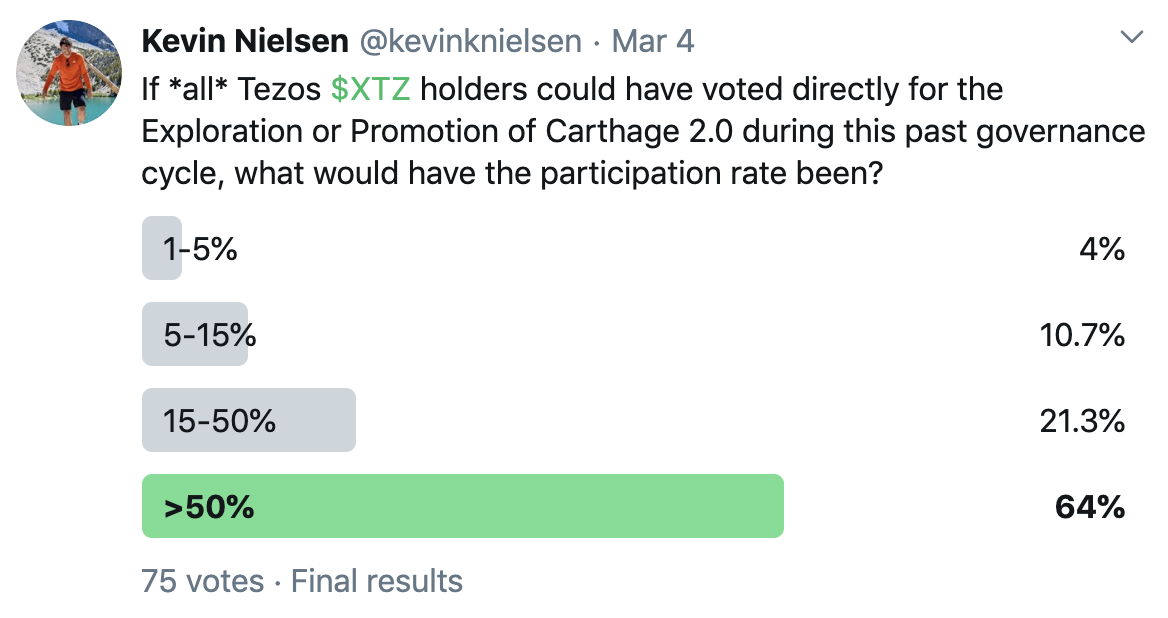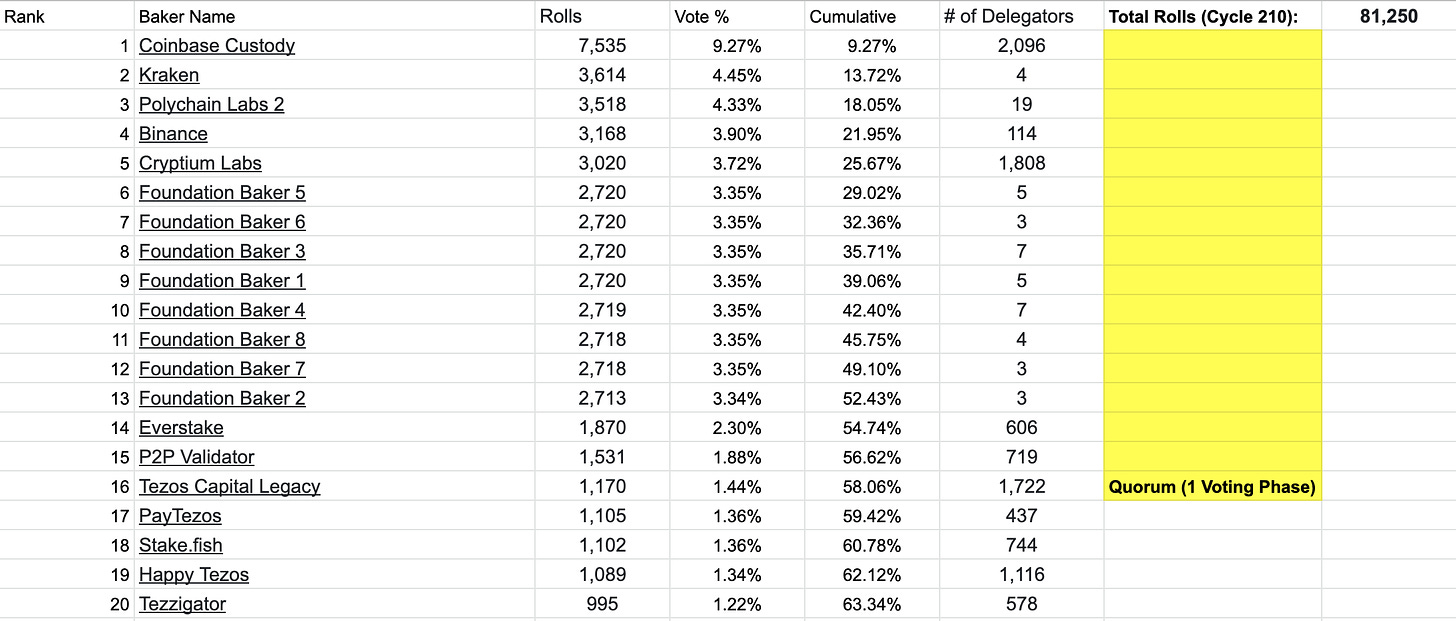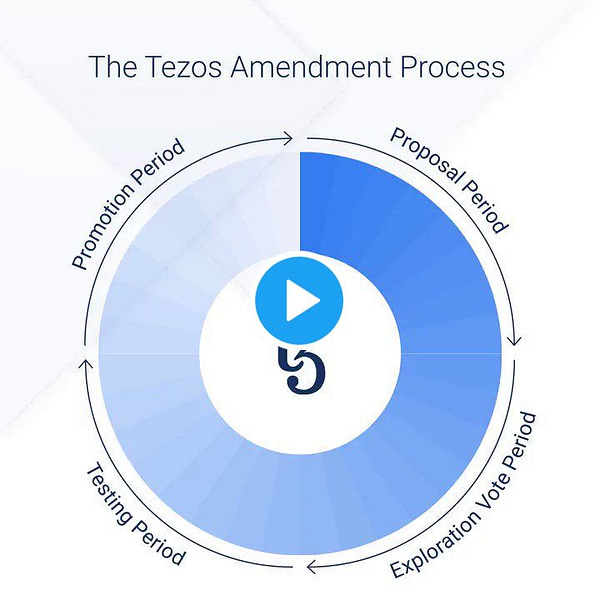Distributed Governance Report: #1
A monthly newsletter aiming to decipher the complex world of distributed network governance, politics, and power. This first edition covers Tezos and Cosmos updates.

A Brief Introduction
The crypto ecosystem needs another newsletter like it needs a hole in the head, but given the dispersed and somewhat siloed coverage of different crypto governance systems and mechanisms, we thought it helpful to begin compiling relevant, network-specific information on a monthly basis - be sure to subscribe! 👇
In order to create frameworks that benchmark and analyze key data points and create somewhat digestible information, we aim to compile as much raw data as possible around different ecosystem governance schemes. These efforts haven’t been prioritized so far given significant stakeholder and participant apathy, as well as the general lack of value and importance of the decisions themselves.
Nevertheless, as these dynamic systems evolve, and their respective ecosystems and networks grow, you can be certain that the value and importance of the decisions being made on all networks, from DApps to protocols, will grow alongside it.
This monthly newsletter should be seen as an aggregator of relevant crypto governance data, starting with Tezos and Cosmos. We hope this can provide the aforementioned data to begin developing logical comparisons across diverse systems:
🔦 News in the Spotlight
Compound looks to decentralize by introducing a new governance token
Compound looks to decentralize its governance by introducing a token to its system that will replace the Compound protocol’s administrator with community governance
Exchanges enable a Steem takeover against the will of the community
In an eery reminder of Barbarians at the Gate, Steemit and Tron moved to reverse a soft fork that sought to reduce their ability to sway governance decisions on Steem.
ProgPoW debate showcases and tests Ethereum governance dynamics
“ProgPoW has become a flashpoint for how Ethereum makes big decisions. The developers have effectively become the legislative body of the decentralized nation-state that is Ethereum. And if they make a decision that makes enough miners angry, it could split the chain (again).” - Brady Dale, Coindesk
Smith+Crown release their 2019 Review: Distributed Governance Report
Smith+Crown releases a 2019 governance report covering “substantial governance activity among projects in the blockchain industry. With many projects actively implementing their intended on-chain governance models, the year’s events provide some of the strongest contrasts yet between different approaches and philosophies.”
WEF Launches Global Consortium for Crypto Governance
The World Economic Forum announces the first global consortium focused on designing a framework for the governance of digital currencies, including stablecoins.
🌐 Network Governance Updates
Governing Tezos

How Does Tezos Governance Work?
This article by Jacob Arluck from TQ Tezos describes how the Tezos amendment process works in practice.
🗞️ Recent Votes
✅ The Carthage 2.0 proposal flies through and passes the Tezos governance cycle
The Carthage proposal, a joint effort from Nomadic Labs and Cryptium Labs, has been referred to as a housekeeping proposal that focused on code cleanup, adding optimizations, and fixing small issues rather than adding significant new features. The only novelty is an increase in the gas limit which will allow executing more complex smart contracts. Learn all about it here.

Participation rates on Tezos remain extremely strong, showcasing the effectiveness of the Liquid Proof of Stake in aligning validator incentives and participation. Nevertheless, it is worth noting that average participation has declined across the last three proposals that have passed the promotion phase, leading to some interesting discussions about validator incentives highlighted below.

🗳️ Live Votes and Proposals
There are currently no live votes on the current Tezos proposal phase.
Let’s take a quick look at the proposals that have passed so far (pre-Carthage):
Athens A (Pt24m4xiP)
Athens A proposed two incremental changes. One was to increase the gas limit by doubling the number of computation steps that can be included in each block. The second was to reduce the “roll” (minimum XTZ needed to bake) size from 10,000 ꜩ to 8,000 ꜩ. Learn more about it here.
Babylon 2.0 (PsBABY5HQ)
This proposal created a new variant of the Tezos consensus algorithm (Emmy+), enabled delegatable tz1 addresses, added Michelson upgrades to improve compilation from high-level languages, and hardened the governance mechanism. Learn more here
🗣️ Signaling: Discussions and Community
Here are some of the discussions that have stood out this month:
Encouraging participation by marking non-voting bakers as “inactive”
Request for Comment on TZIP-12 (FA2): A Multi-Asset Interface for Tezos
A simple comparison of the current reward system with the one in Carthage
Tezos Core Development AMA – Nomadic Labs, Cryptium Labs, DaiLambda
🛠️ Tool Highlight: The Tezos Agora Forum
Interestingly, a poll I recently tweeted out showed some weird results from 75 respondents. Although most other governance systems that allow for direct coinholder voting have consistently displayed horrendous participation rates and blatant voter apathy, it seems 64% of the community believed that Tezos participation would still remain above 50% if every tokenholder could cast a vote:

📅 Calendar
The Proposal Period will approximately end on Mar 28, 2020
👥 Major Stakeholders
Who controls Tezos governance?

Governing Cosmos

From Gavin at Figment Networks
How Does Cosmos Hub Governance Work?
This article by Felix Lutsch from Chorus One provides a great overview and covers how a proposal is submitted, how deposits are collected, how the voting happens, and how the final outcome is determined:

🗞️ Recent Votes
✅ The Cosmos Governance Working Group - Q1 2020 proposal passes
This proposal was submitted to initiate a governance working group that develops decentralized community governance efforts alongside the Hub’s governance development. The GWG will build governance participation capacity with Cosmos stakeholders by developing and documenting governance practices and features, and by communicating these to the broader Cosmos community. Learn about it here.


🗳️ Live Votes
There are currently no live votes on Cosmos Hub 3.
📄 Draft Proposals
There are a number of draft governance proposals that are not yet public. There are also a number of ideas and conversations that could be used to inspire governance proposals. The governance working group would like the opportunity to help by providing feedback and educational resources. Consider joining the Cosmos Governance Working Group (GWG) channels (forum, Telegram, Discord) to discuss.
Proportional Slashing – A draft proposal by Sunny (All in Bits; Sikka). In a recent Twitter reply, Sunny expressed an interest in having the GWG provide feedback on a proposal to change the rate that the Cosmos Hub slashes the stake-backing of validators that break protocol rules. Rather than a fixed slashing percentage, larger validators would be slashed at a much higher rate than small validators for both liveness faults (being offline) and equivocation (double-signing). What will voters want to know in order to make an informed decision when voting? There have been some Twitter discussions, beyond the forum discussions, and Bison Trails published an article discussing this proposal. Check out Sunny’s draft proposal and the architecture decision record (ADR).
🗣️ Signaling: Discussions and Community
Here are some of the discussions that have stood out this month:
How should the Cosmos Hub’s codebase be owned and controlled?
In the Telegram channel, Hyung (B-Harvest) expressed that Github repo control is a crucial governance topic. Marko (Interchain GmbH) thinks GitHub controls should be moved to the Interchain Foundation since Marko considers them to be an unbiased party whose mandate is Cosmos and the Interchain.Should we increase the severity of the slashing?
Marko (Interchain GmbH) thinks that ~18 hours downtime without slashing is too long and gives people the chance to run non-safe setups. We discussed this in the Governance channel on Discord.Should other Cosmos Hub parameters be changed?
Christopher (Cryptium Labs) used the forum to suggest that a number of parameters be changed, including changing equivocation (double-sign) slashing from 5% to 20%, changing the speed that inflation changes to 4x faster, and changing the max validators from 125 to 150. You can read about parameter change proposals here, but the documentation is still being developed.Should a validator’s vote count once they're removed from the active set?
Gavin (Figment Networks) and Sunny (All in Bits; Sikka) realized that a validator could vote and then be removed from the active set by 1) getting pushed down in rank below 125 2) being jailed for downtime or 3) being tombstoned for double-signing. Delegators to a validator outside of the active set will not have their vote count, even if they override their validator. Most of the discussion took place on the forum and some on Twitter.
👥 Major Stakeholders
Who controls Cosmos Hub 3 governance?

The Distributed Governance Report is a monthly newsletter aiming to decipher the complex world of distributed network governance, politics, and power. This first edition covers Tezos and Cosmos updates, stay tuned for the next one coming in April by subscribing now, and never miss an issue:





